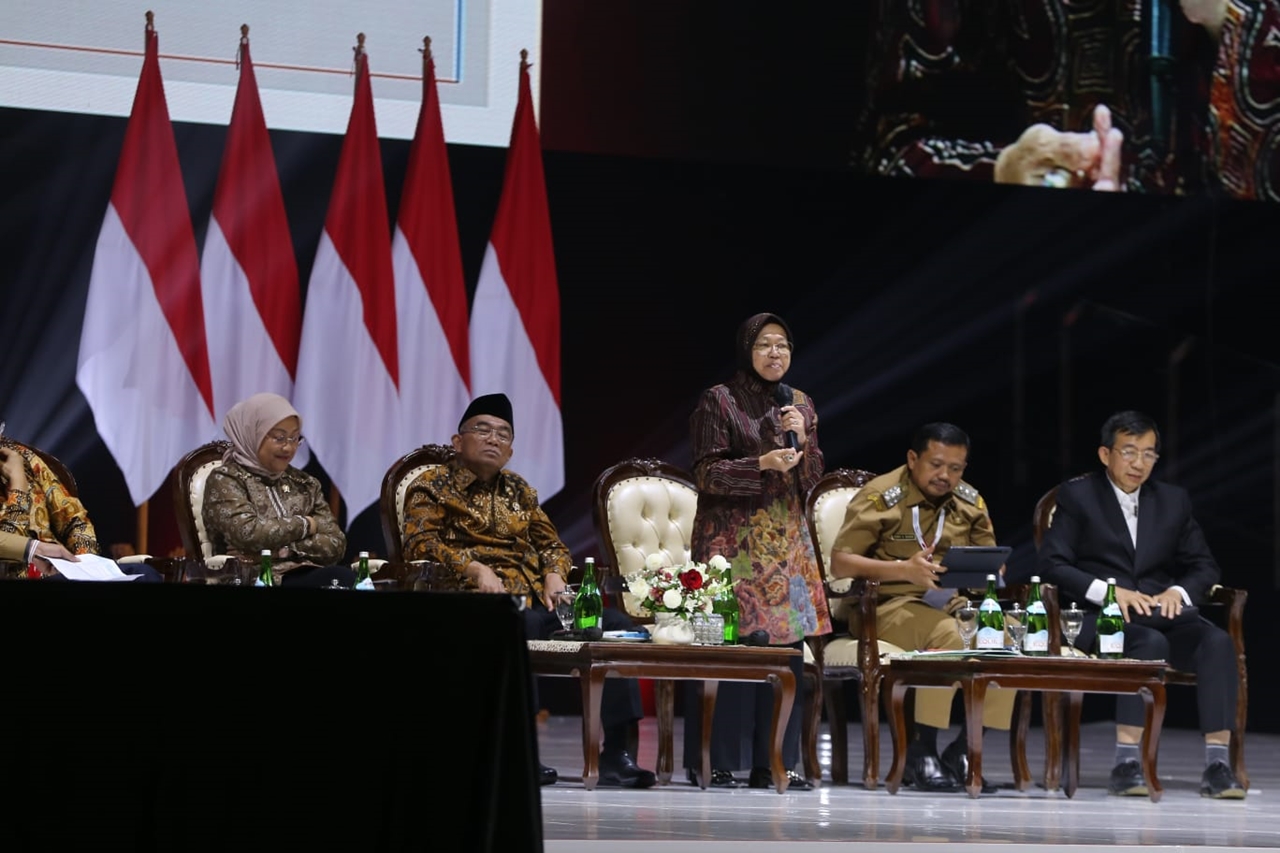The Social Affairs Minister Emphasized The Regional Government's Important Role in Updating the DTKS

BOGOR (January 17, 2023) – The Integrated Social Welfare Data (DTKS) is the cornerstone for identifying and assisting social welfare recipients. Continuous updates and enhancements to DTKS remain pivotal to ensuring the accurate targeting of social assistance programs.
Minister of Social Affairs, Tri Rismaharini, emphasized the critical responsibility of regional governments in the ongoing improvement and maintenance of DTKS. "Following the laws, data improvements conducted by the regions," she said as a resource person during a panel discussion at the National Coordination Meeting of Regional Heads and the 2023 Regional Leadership Communication Forum (Forkopimda) at the Sentul International Convention Center, Bogor, Tuesday (17/1 ).
Following Law No. 13 of 2011 on Poverty Reduction Management, Minister Rismaharini underscored the statutory requirement for DTKS to undergo updates at least every two years. However, given the dynamic nature of data, particularly evident during her tenure amidst the COVID-19 pandemic, she highlighted the necessity for more frequent updates.
"Changes in data due to various factors such as mortality rates evolve rapidly, especially during crises like the COVID-19 pandemic. Therefore, we have transitioned to monthly updates to ensure the accuracy and relevance of DTKS," she stated.
Furthermore, Minister Rismaharini outlined the streamlining of criteria for identifying potential recipients, reducing them from 46 to nine. This simplification process aims to expedite the proposal and verification process, involving input from sub-districts up to the provincial level before submission to the Ministry of Social Affairs.
“Then I will determine the proposal from the region. I determine the data used as the basis for assisting," said the former Mayor of Surabaya.
According to the Minister of Social Affairs, there are four considerations in improving data e.g. poverty, disasters, weekly realization evaluation, and birth/death/displacement. “There is a disaster almost every day, so new poor people are born. Their house is gone," she said.
In the new DTKS improvement cycle explained by the Minister of Social Affairs, in the verification and validation process, DTKS is compared with Dukcapil, BKN, AHU, and BPJS Ketenagakerjaan data. This aims to avoid data errors such as civil servants and company administrators, who are registered at the Directorate General of General Legal Administration (AHU) belonging to the Ministry of Law and Human Rights, being included in the list of social assistance recipients. The Minister of Social Affairs also implements quality assurance and provides public information such as the "rebuttal proposal" feature to maintain data validity.
Currently, there are 148.7 million people registered with DTKS. This data is valid data that is compatible with Dukcapil. The Minister of Social Affairs also explained the participation of regional governments in DTKS verification where 33.8 million data were corrected by regional governments. However, now there are 19.6 million new proposals that must be verified and validated by the regional governments.
The Minister of Social Affairs urged regional governments to take an active role in improving data, considering that DTKS is a reference to distributing social assistance at both the central and regional levels. One of them is a reference for the participation of Health Insurance Contribution Assistance Recipients (PBI JK).
The Minister of Social Affairs invited regional governments to take an active role in improving data considering that DTKS is used as a reference in the distribution of social assistance at both the central and regional levels. One of them is a reference for the participation of National Health Insurance Contribution Assistance Recipients (PBI JK).
“Currently, many regions are asking the Minister of Health for additional proposals for PBI. I have already proposed adding the Minister of Finance. But what was approved was only the PBI for disabilities," she said to Health Minister Budi Gunadi Sadikin who was also a resource person on panel III.
Furthermore, the Minister of Social Affairs did not only present data but also explained the Ministry of Social Affairs' programs to improve the social welfare of the community, such as Social Assistance, Nusantara Economic Heroes (PENA), the provision of social granaries for disaster-prone areas, ATENSI Creation Centers, and most importantly the birth of a new, more dynamic DTKS.
Besides the Social Affairs Minister and Health Minister, the event was also attended by the Coordinating Minister for Human Development and Culture Muhadjir Effendi, Minister of Manpower Ida Fauziah, Regent of Sumedang Dony Ahmad Munir, and Physicist Yohanes Surya, who explained his efforts to teach Indonesian children to be good at counting.
 English
English
 Bahasa
Bahasa
